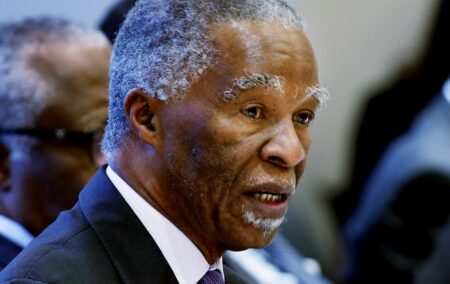Few recent statements have more clearly illuminated the crippling delusion at the heart of the ANC’s political project than former President Thabo Mbeki’s characterisation of the crisis in the ruling party.
But for a few words, it looks solid and trenchant.
‘It is obvious,’ he wrote in an eight-page – and soon leaked – letter to ANC Deputy Secretary-General Jessie Duarte, ‘that if nothing changes with regard to the conditions and factors which helped to produce this outcome, and certainly if matters get worse, this will certainly lead to a strategic defeat of the progressive movement and a historic victory for the right-wing.’
That the party that has been running the country into the ground for two decades is facing a moment of truth is beyond question.
But a core factor in its gathering failure is the depth of its own delusion about being remotely progressive – and not least for having unquestioningly adopted the founding principle of apartheid and its right-wing architects and being willing to exploit it at South Africa’s expense.
This inescapable feature of post-democratic life was pointedly highlighted in an Institute of Race Relations (IRR) press release last week on the Employment Equity Amendment (EEA) Bill, when IRR head of campaigns and Daily Friend writer Gabriel Crouse noted: ‘While the state prepares to roll out race quotas across private life it has yet to provide any legal standard to judge who belongs to which race.’
He added: ‘If the EEA cannot be blocked either by veto or court action, expect people of all hues to describe themselves as “African”, which is justified since that is what all South Africans are.’
Discredited racialism
Many things explain the ANC’s declining fortunes, but one of them is the growing popular rejection of the discredited racialism that now self-evidently stands in the way of a thriving, stable and prospering country – of a progressive country, you could say.
The terrible irony of Mbeki’s misapprehension is that he seems to suggest that more of the same is the answer to the ruling party’s recovery.
‘The results of the LGE [local government election] underline in the most emphatic manner the imperative to respect the people and, therefore, the need to honour the commitments we made in the 2019 and the 2021 election manifesto.’
Whatever introspection his intervention might stimulate, it is clear it will not run so far as a recognition of the basic contradiction revealed, as Crouse highlighted last week, by the absence of ‘any legal standard to judge who belongs to which race’.
As liberals kept telling generations of Nationalists, racialism fails on the grounds of reason: it is simply unintelligent to cleave to the idea of an immutable law that endows people on the grounds of appearance with given qualities for all time. It is counter to science, and to human history.
And, of course, where reason fails, moral error follows; racism and bigotry and the long record of contriving to use identity to qualify rights and the indivisible commonalities of humanity.
In South Africa, the dubious lodestar was the Population Registration Act of 1950.
Bluff ‘common sense’
It invoked a sort of bluff ‘common sense’ to suggest it was merely codifying what was obvious.
The Act said ‘“white person” means a person who in appearance obviously is, or who is generally accepted as a white person, but does not include a person who, although in appearance obviously a white person, is generally accepted as a coloured person.’ (Hence the need for pencil tests and other such demeaning expedients). ‘“Coloured person” means a person who is not a white person or a native’, and ‘“native” means a person who in fact is or is generally accepted as a member of any aboriginal race or tribe of Africa’.
On this foundation, the entire edifice was built.
The Nationalists repealed the law in 1991. But that deceptive ‘common sense’ had an afterlife.
For all the seeming force of the headline non-racial declarations of the Constitution (and the Freedom Charter well before it), post-1994 legislation has kept returning to the concept of racial definition.
Thus, for example, the Employment Equity Act of 1998 and the Broad-Based Black Economic Empowerment Act of 2003 offer the following as a definition: ‘“black people” is a generic term which means Africans, Coloureds and Indians’. Everybody else, presumably, is ‘white’.
As I wrote last year: ‘If what is meant by these terms is not the definitions of the expunged 70-year-old Population Registration Act, it is not clear what they might be.’
Unprogressive
The consequences are measurable in real-world terms, and they are predictably unprogressive.
Anthea Jeffery noted last week: ‘The (Employment Equity) Act, which the (EEA Amendment) Bill will significantly tighten up, has been in force for more than 20 years but has done little to “promote the achievement of equality”.
‘On the contrary, income inequality as measured on the Gini coefficient has increased in this period. This is largely because EE rules have widened inequality within the black majority by helping a small group to forge ahead, even as 10.7 million black people remain jobless and mired in destitution.’
This is the spectre Mbeki avoids, preferring to reckon with imaginary ‘right-wing’ adversaries. But the real enemy is something other.
The ideologues of apartheid were shamed for their long and costly attachment to the racialism myth. The ANC might in time be compelled to appreciate that their attachment to it is central to the strategic defeat it is now openly contemplating.
[Image: https://www.flickr.com/photos/96739999@N05/27369068406]
If you like what you have just read, support the Daily Friend

